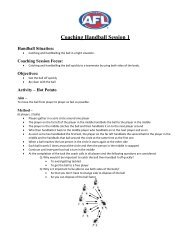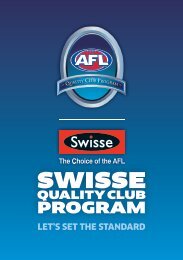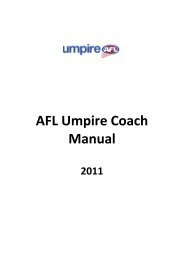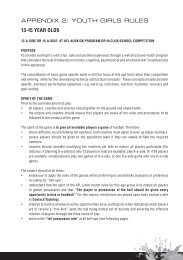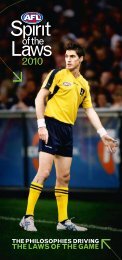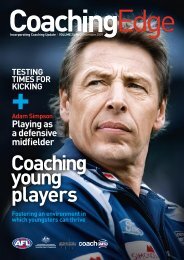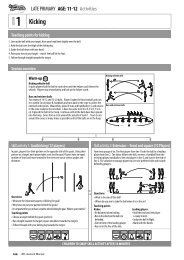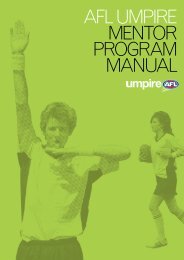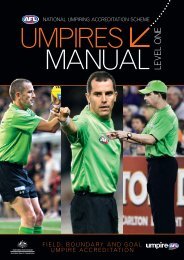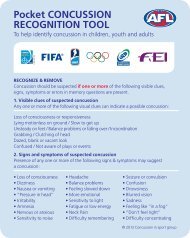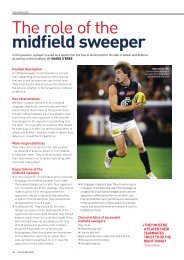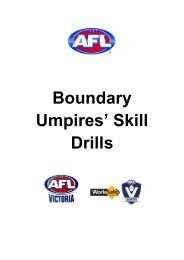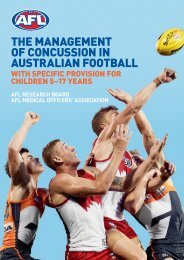Coaching Edge - AFL Community
Coaching Edge - AFL Community
Coaching Edge - AFL Community
You also want an ePaper? Increase the reach of your titles
YUMPU automatically turns print PDFs into web optimized ePapers that Google loves.
METHODICAL: Collingwood coach Nathan<br />
Buckley is meticulous with the planning<br />
and execution of his training sessions.<br />
A section of a coach’s<br />
plan might look like this:<br />
Time:<br />
Activity: <br />
Duration:<br />
Coach:<br />
Aim/<br />
outcome:<br />
6pm<br />
Handball game – 4 teams<br />
of 5 players, swap on 3 mins<br />
15 mins<br />
Daniel K<br />
Quick hands, run at<br />
opposition, ball control<br />
It is also worthwhile for a coach to consult<br />
assistant coaches and trusted players<br />
regarding the needs and desired outcomes<br />
of a particular session. These will be derived<br />
either from the previous game (areas the team<br />
needs to improve on) or the upcoming game<br />
(areas in which the team needs to be sharp if it<br />
is to beat its next opponent).<br />
Once these needs and outcomes are<br />
determined the coach should include them on<br />
the practice session plan. They then become<br />
the written cues or “signposts” of that session<br />
and the coach can refer back to them at a<br />
glance to ensure the session is on the right<br />
track. I would try to limit these “themes” to<br />
three, and maybe write them in red at the<br />
top of the page.<br />
This article was written as part of the requirements for <strong>AFL</strong> High<br />
Performance Coach Accreditation. At the time of writing Danny<br />
was an assistant coach with the NSW/ACT RAMS.<br />
“Signposts” for a particular session might<br />
look like this:<br />
»»<br />
QUICK ball movement (be instinctive).<br />
»»<br />
Running to LINK up (repeat efforts).<br />
»»<br />
Instructional VOICE (coach your<br />
teammates).<br />
These themes usually contain the same<br />
language or terminology the coach uses on<br />
match days and so are instantly recognised<br />
by the players. Repeating these themes<br />
during training helps reinforce the coach’s<br />
style and philosophy to the players.<br />
Here are some of the areas a coach might look to<br />
address when designing a practice session plan:<br />
»»<br />
Dynamic warm-up: minimum 10 minutes<br />
to get enough heat into the muscles –<br />
including some stationary skills.<br />
»»<br />
Skills: practising the basics of the game<br />
and refining ball control – drills can be<br />
controlled or random.<br />
»»<br />
Decision-making: usually best done<br />
through mini-game drills – for example,<br />
“Forward Scout”.<br />
»»<br />
Contested ball: short-burst activity, with<br />
pressure applied – can be either in drill or<br />
game situations.<br />
»»<br />
Game style: how we want to play – long,<br />
quick and direct/inside versus outside/<br />
slow versus fast (tempo).<br />
»»<br />
Area specifics: strategies and set-ups<br />
– backline play/midfield and stoppage<br />
work/forward line play.<br />
»»<br />
Fitness: specific to the phase of the<br />
football year – always try to incorporate<br />
balls in fitness drills.<br />
»»<br />
Warm-down: minimum 10 minutes –<br />
including some static stretching,<br />
usually partner-based, with minimum<br />
15-second holds.<br />
It might take 10 to 30 minutes to draw<br />
up a practice session plan, depending on<br />
the time of year, the number of drills or<br />
games the coach wants and the complexity<br />
of the session.<br />
Time spent planning practice is time<br />
well spent.<br />
Making a habit of drawing up a practice<br />
session plan will increase a coach’s football<br />
knowledge and understanding of the mental<br />
and physical capabilities of the team and<br />
individual players.<br />
Don’t be too precious with the plans –<br />
and include some fun elements.<br />
After all, if players are enjoying practice<br />
they usually perform accordingly.<br />
COACHING EDGE / JUNE JULY 2013 // 29



